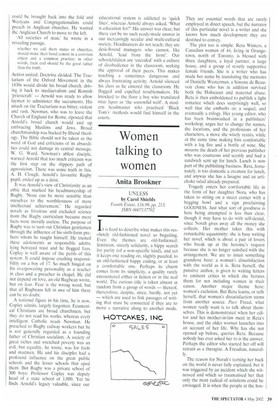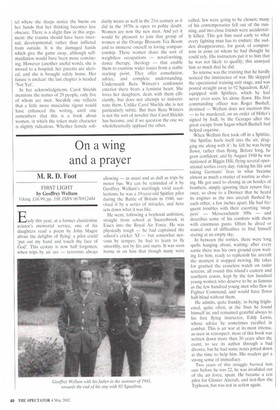Women talking to women
Anita Brookner
UNLESS by Carol Shields Fourth Estate, £16.99, pp. 213, ISBN 0007137702 It is hard to describe what makes this resolutely old-fashioned novel so beguiling. Even the themes are old-fashioned: feminism, sisterly solidarity, a hippy search for purity (of a non-specific kind), and yet it keeps one reading on, slightly puzzled, to an old-fashioned happy ending, or at least a comfortable one. Perhaps its charm comes from its simplicity, a quality rarely encountered either in fiction or in the real world. The curious title is taken almost at random from a group of words — thereof, theretofore, despite, since, hardly, not yet — which are used to link passages of writing that must be connected if they are to move a narrative along to another mode.
They are essential words that are rarely employed in direct speech, but the narrator of this particular novel is a writer and she knows how much development they are destined to convey.
The plot too is simple. Reta Winters, a Canadian woman of 44, living in Orangetown. north of Toronto, is blessed with three daughters, a loyal partner, a large house, and a group of stoutly supportive female friends. She is a writer who has made her name by translating the memoirs of Danielle Westerman, a Simone de Beauvoir clone who has in addition survived both the Holocaust and maternal abuse. Reta is then emboldened to publish a light romance which does surprisingly well, so well that she embarks on a sequel, and eventually a trilogy. Her young editor, who has been brainwashed in a publishers' workshop, urges her to change the names, the locations, and the professions of her characters, a move she wisely resists, while at the same time making him comfortable with a log fire and a bottle of wine. She mourns the death of her previous publisher who was courteous and seemly and had a sandwich sent up for lunch. Lunch is now part of the publishing business. Reta, fortunately, is too domestic a creature for lunch, and anyway she has a lasagne and an artichoke salad already prepared.
Tragedy enters her comfortable life in the form of her daughter Nora, who has taken to sitting on a street corner with a begging bowl and a sign proclaiming GOODNESS. Just what sort of goodness is here being attempted is less than clear, though it may have to do with self-denial, since Norah gives away all the money she collects. Her mother takes this with remarkable equanimity: she is busy writing her novel, which is about a pair of lovers who break up at the heroine's request because she is no longer satisfied with the arrangement. We are to intuit something grandiose here: a woman's dissatisfaction with the world as it is. Reta herself, the putative author, is given to writing letters to eminent critics in which she berates them for not including women in their canon. Another major theme here: women's exclusion. But Reta learns, or tells herself, that women's dissatisfaction stems from another source. Pace Freud, what women really want is to talk about themselves. This is demonstrated when her editor and her mother-in-law meet in Reta's house, and the older woman launches into an account of her life. Why has she not opened up before, queries Reta. Because nobody has ever asked her to is the answer. Perhaps the editor who started her off will retrain as a therapist. A Freudian, naturally.
The reason for Norah's turning her back on the world is never fully explained, but it was triggered by an incident which she witnessed and which so traumatised her that only the most radical of solutions could be envisaged. It is when the people at the hos
tel where she sleeps notice the burns on her hands that her thinking becomes less obscure. There is a slight flaw in this argument: the trauma should have been internal, developmental, rather than inflicted from outside. It is the damaged hands which give the game away, although selfmutilation would have been more convincing. However (another useful word), she is moved to a hospital, her parents are alerted, and she is brought safely home. Her future is unclear: the last chapter is headed 'Not Yet'.
In her acknowledgments Carol Shields mentions the names of 29 people, only five of whom are men. Sneakily one reflects that a little more masculine rigour would have enhanced the writing, until one remembers that this is a book about women, in which the token male character is slightly ridiculous. Whether female soli
darity wears as well in the 21st century as it did in the 1970s is open to polite doubt. Women are now the new men. And yet it would be pleasant to join that group of women at the Orange Blossom Tea Room and to immerse oneself in loving companionship. These women share the sort of weightless occupations — novel-writing, dance therapy, theology — that enable them to examine wider issues from a stable starting point. They offer consolation, advice, and complete understanding. Underneath Reta Winters's conformist exterior there beats a feminist heart. She loves her daughters, deals with them efficiently, but does not attempt to indoctrinate them. Unlike Carol Shields she is not particularly subtle. But then Reta Winters is not the sort of novelist that Carol Shields has become, and if we question the one we wholeheartedly applaud the other.







































































 Previous page
Previous page